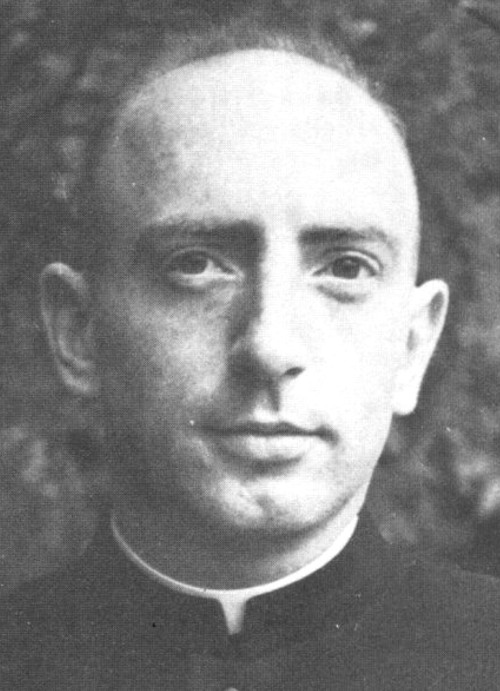Search for Names, Places and Biographies
Already layed Stumbling Stones
Suche
Eduard Müller * 1911
Holstenglacis 3 (Untersuchungsgefängnis) (Hamburg-Mitte, Neustadt)
1942 verhaftet
enthauptet 10.11.1943
- http:/
/ de.wikipedia.org/ wiki/ L%C3%BCbecker_M%C3%A4rtyrer
(Lübecker Märtyrer auf Wikipedia) - http:/
/ www.erzbistum-hamburg.de/ ebhh/ Lueb_maertyrer/ chronik.php
(Internetseite des Erzbistums Hamburg) - http:/
/ www.luebeckermaertyrer.de/ de/ index.html
(Informationsseite der Geschäftsstelle Lübecker Märtyrer)
further stumbling stones in Holstenglacis 3 (Untersuchungsgefängnis):
Heinz Jäkisch, Bernhard Jung, Karl-Heinz Keil, Hermann Lange, Johann Odenthal, Johannes Prassek, Rudolf Schöning, Karl Friedrich Stellbrink, Walter Wicke, Walerjan Wróbel
Eduard Andreas Paul Müller, born on 20 Aug. 1911 in Neumünster, executed on 10 Nov. 1943 in the Hamburg-Stadt pretrial detention facility
Holstenglacis 3 (in front of the pretrial detention facility)
Eduard Müller was the youngest of seven children and grew up in poor circumstances in Neumünster. His father, the shoemaker Eduard Müller, who had converted to the Catholic faith before getting married in 1896, had left the family after his return from World War I. In 1934, he was apparently involved in an accident as a switchman working for a private railway company. The mother Karoline, née Hundeshagen, had to make ends meet with odd jobs.
After attending the eight-grade elementary school (Volksschule) in 1925, Eduard Müller first learned the carpenter’s trade. He was active in the Catholic youth movement and he would have liked to become a priest. A former female teacher of his and the Neumünster chaplain Bernhard Schräder (born in 1900, died in 1971) supported him and procured sponsors, so that he could graduate from high school in 1935 at the "college for late vocations” ("Spätberufenen-Kolleg”) in Bad Driburg and then start studying theology in Münster. On 25 July 1940, Eduard Müller was ordained priest in the cathedral of Osnabrück. In September of the same year, he came to Lübeck. In the Herz-Jesu parish, Eduard Müller was particularly popular with young people and "ordinary” folks. Although church association work with young people was already forbidden, he continued to look after youth groups, with whom he also talked about day-to-day political events and the military situation. A projector in the group rooms was to suggest harmless slide shows. Eduard Müller obtained his information from leaflets and British radio stations.
After a denunciation, Eduard Müller was arrested on 22 June 1942 and first committed to the Marstall Prison on Burgtor. Although it was impossible to charge him with any public criticism of the Nazi regime, the "People’s Court” (Volksgerichtshof) sentenced him to death on 23 June 1943 in the so-called Lübeck "Christian Trial” for "undermining of military strength” ("Zersetzung der Wehrkraft”) and "preparation to high treason” ("Vorbereitung zum Hochverrat”), as it did the Catholic chaplains Hermann Lange (see corresponding entry) and Johannes Prassek (see corresponding entry), and the Protestant pastor Karl Friedrich Stellbrink (see corresponding entry). On 10 Nov. 1943, the sentence was executed in Hamburg in the courtyard of the Holstenglacis pretrial detention center with the guillotine.
Since 1988, a commemorative plaque in the ramparts on the back wall of the pretrial detention center has been commemorating the four "Lübeck clergymen.” Two churches, the Catholic Probsteikirche Herz Jesu, the Protestant Lutherkirche, and as other public places in Lübeck commemorate the clergymen as well. On 25 June 2011, the Catholic chaplains Müller, Lange, and Prassek were beatified in Lübeck. The Protestant pastor Friedrich Stellbrink was honored during the festivities.
Translator: Erwin Fink
Kindly supported by the Hermann Reemtsma Stiftung, Hamburg.
Stand: May 2020
© Susanne Rosendahl
Quellen: StaH 242-1 II Gefängnisverwaltung II, Ablieferung 1998/1; StaH 332-5 Standesämter 1167 u 731/1943; http://www.luebeckermaertyrer.de/de/index.html (Zugriff 16.3.2016); Gedenkstätte Deutscher Widerstand, http://www.gdw-berlin.de/vertiefung/biografien/personenverzeichnis/biografie/view-bio/eduard-mueller/?no_cache=1 (Zugriff 16.3.2016); http://www.unitas-ruhrania.org/index.php?page =126 (Zugriff 16.3.2016); Pelke: Christenprozess; Voswinkel: Geführte Wege.


